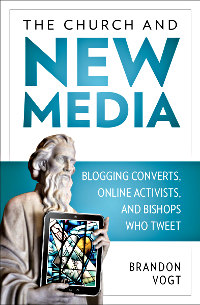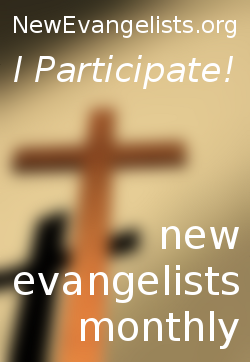
Brandon Vogt’s new book The Church and New Media will be released tomorrow (preorders are accepted now at OSV, Amazon paperback / Kindle and probably others).
The book is endorsed by “heavy hitters” Archbishop Timothy Dolan (New York), Cardinal Seán O’Malley (Boston), Cardinal Donald Wuerl (Washington), Archbishop Charles Chaput (Denver/Philadelphia) and many others. Contributors to the book include some of the most popular Catholic bloggers on the web. The first 6 chapters alone were written by 6 bloggers I routinely follow: Father Robert Barron, Jennifer Fulwiler, Marcel LeJeune, Mark Shea, Taylor Marshall and Father Dwight Longenecker. With endorsements and contributors like these, the book was a must read for me!
You will want to read the book if you are interested in how the Church has begun to harness the immense power of the online world. Perhaps you feel called to share your faith in this way, to evangelize and to bring others into the Church or deepen their own faith. Perhaps you are a capable apologist or perhaps you simply know some great recipes for meatless Fridays. There is a constituency “out there” and new media connects you to them. You will benefit too, through the discipline of writing and researching your content ideas, your own knowledge of Christ and His true Church will be deepened and strengthened.
The book is divided into 4 parts, of 3 chapters each, focusing on evangelization, formation, community and the common good:
- Father Robert Baron begins, stressing the importance of evangelical engagement via videos and his positive experience addressing “Youtube heresies.” I know Father Baron through his YouTube ministry Word on Fire.
- Jennifer Fulwiler discusses how she was converted from atheism to Catholicism through her blogging experience. She presents the interactive power of the medium and its broad reach. I know Jen through her blog Conversion Diary.
- Marcel LeJeune looks at the challenges and opportunities in reaching young adults. He discusses the very impressive results Texas A&M has achieved through a wide range of online initiatives. I know Marcel through his blog Aggie Catholics.
- Mark Shea examines the content of a blog, topics, ideas, comments and so on. If you are thinking about blogging but have concerns about what to say and how to say it, this chapter is for you. I know Mark through his blog Catholic and Enjoying It!
- Taylor Marshal positions new media as a teaching tool and presents his reference based approach to apologetics. I know Taylor through his blog Canterbury Tales
- Father Dwight Longenecker (married Anglican priest convert) blogs in a wide variety of styles, including “guest bloggers” he invented! I know Fr. Longenecker from his blog Standing On My Head
The last 6 chapters apply new media beyond blogging. Scot Landry discusses new media opportunities at the diocesan level with lots of powerful tips and advice. Similarly at the parish level, Matt Warner explores ways to connect with current and potential parishioners. Lisa Hendey looks outside of our formal organizational structure, focusing on Catholic communities wherever they are. Tom Peters looks to bypass old media through “Catholic online activism.” Shawn Carney tells how he uses new media to grow a powerful digital movement – 40 Days for Life.
Brandon concludes his book looking to the future, potential pitfalls, how new media can be leveraged in digital evangelism and the good outcomes it could achieve. New media is a game changer comparable to what Gutenberg brought the world 500 years ago.
Structurally, The Church and New Media includes a table of contents, an afterword by Archbishop Dolan, a glossary, an appendix, acknowledgments and extensive endnotes (clickable in the eBook version). Many interesting sidebars appear throughout the book.
All proceeds from the sale of the book are directed toward establishing school computer labs in the Archdiocese of Mombasa, Kenya.
The bottom line: this is a unique, insightful book written by people with a ton of street cred, folks who each have had significant success in new media. We are each called to be disciples and the online world has huge potential for saving souls. The Church and New Media tells us how.
Full disclosure: I am quoted in one of the sidebars.
























A number of Protestant pastors are using the book as well to find ways to reach people using social media. Mainline Protestantism is about where Catholicism is in terms of their use of Facebook and such.
I hope that they use it, that would be awesome! Most (maybe all) of the information is not Catholic specific. The more Christians who effectively use new media, the better.